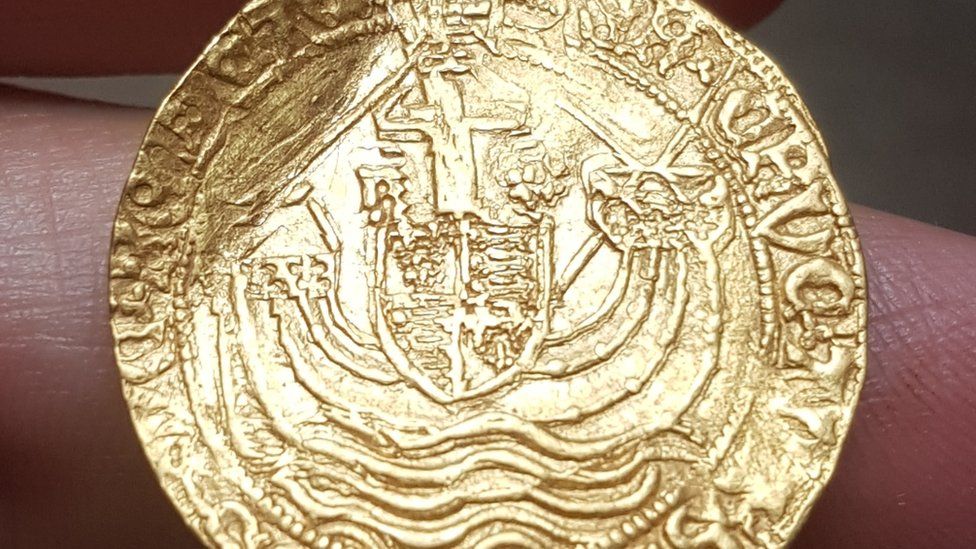What is it like to strike rich while metal detecting?
- Published

Four years after finding a new hobby, Gareth Millward was about to experience the same rush felt by many explorers and metal detectorists before him - the discovery of "treasure".
Last summer, the 37-year-old, from Middleton in Derbyshire, literally struck gold when out near Ashbourne with his trusty metal detector.
When he started hearing the right noises, he began to dig, and to his amazement unearthed a rare gold coin dating from the reign of Henry VII, founder of the Tudor dynasty and the only Welshman to sit on the English throne.
How did it feel?
"It was unreal," Mr Millward said.
"I stood there with it for a while and took photos and rang people.
"I didn't know at first it was so unusual. I knew it was a medieval gold coin and would be valuable, but I didn't know which king it was and things like that.
"Within an hour, I found out and I was quite excited. It's hard to say, I can't really remember, but I was shouting about in the field."
Why take part in metal detecting?
Mr Millward has found a number of unusual objects on his trawls of the countryside, including silver coins and historical trinkets.
He said he spends as much time as possible out in the fields of Derbyshire.
"I got started as a bit of fun," he said.
"Me and a friend went halves on a cheap metal detector and went looking for stuff.
"I got quite into it and bought a better detector and it's become my favourite hobby.
"I go out 10 hours a week on average - unless it's raining, I'll be out."
Luckily for Mr Millward, the hot summer of 2018 meant last July he was blessed with perfect weather, allowing him the chance to stumble across the long-lost coin, valued at about £4,000.
"At the end of the heatwave last year, it was a very hot day, and I went and knocked on the door of this house," he said.
"The chap let me go detecting and pointed me in the direction of the field he was happy for me to go in.
"I started and went towards this river, and within about 20 minutes I found it."
What did the landowner say?
Mr Millward said: "He was a little bit sad, because he said his dad would have loved to see it, but he'd died a few weeks before.
"He said I was allowed to keep it, so I've not had to sell it and split the money, which is nice.
"I've brought it back a few times for him to see it, and I've got to know the family."
What happened next?
Mr Millward registered his find with the Portable Antiquities Scheme (PAS) and the coin now features in its online database.
It is one of just 15 gold coins registered with the PAS to have been found in Derbyshire, with gold coins making up 3.7% of coins the scheme knows to have been found across England and Wales.
Under the Treasure Act 1996, finders of potential treasure in England, Wales and Northern Ireland are legally obliged to notify their local coroner - and can face an unlimited fine or up to three months in prison if they do not report their finds.
As Mr Millward only found a single coin, he did not have to get in touch with the authorities, but by registering where he found it, he has helped experts to build a better picture of the country's historical record.
How significant was the find?
Alastair Willis, finds liaison officer for Derbyshire and Nottinghamshire, welcomed Mr Millward's decision to register the coin.
"It's quite good he came in to report it, because we don't get that many medieval gold coins, we get more Iron Age ones," he said.
"It's definitely an unusual find - you tend to find more things the further east and south you go in the country."
Mr Willis advised people to register any find with the PAS to help historians and archaeologists, and encouraged amateur detectorists to avoid digging into unploughed fields.
"If you're on ploughed land, you're not disturbing the evidence that archaeologists need to date the material," he said.
What will Mr Millward do next?
Mr Millward has kept the coin, which is the star item in his growing collection.
"I get quite obsessed with the things I find - they're beautiful, and the more I find, the more I want," he said.
"Unless I suddenly need some money, I'll keep it."
Mr Millward hopes to carry on ploughing the same secret plot for treasure - and it isn't the prospect of financial failure he fears.
He said: "What I dread is going back and seeing every man and his dog with a metal detector in my field."
Follow BBC East Midlands on Facebook, Twitter, or Instagram. Send your story ideas to eastmidsnews@bbc.co.uk.
- Published31 January 2019
- Published14 December 2018
- Published23 November 2017